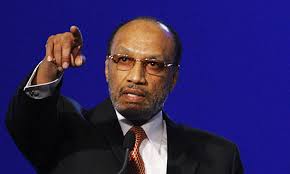By Andrew Warshaw
November 21 – The whistleblower who worked on Qatar’s 2022 World Cup bid campaign says there is no doubt that Mohamed Bin Hammam – banned for life from football two years ago – was part of the team despite 2022 officials repeatedly denying he played any role.
Phaedra Al-Majid, who left her communications job in March 2010 – nine months before Qatar’s landslide victory – has become a key figure in the muddled World Cup corruption saga over the past few days, pouring scorn over Qatar’s version of events. She has also admitted to working with the FBI and its investigation.
Although she has changed her story several times about powerful African officials being paid to vote for Qatar and had her evidence to Michael Garcia’s inquiry deemed unreliable, nevertheless she insists she was forced into retracting her claims of corruption only after being threatened with legal action by the Qataris, having run out of legal aid herself.
After her evidence to Garcia’s inquiry was publicly called into question by FIFA ethics judge Hans-Joachim Eckert, Al-Majid decided to go public. She told the BBC that to suggest bin Hammam, former head of the Asian Football Confederation and himself a Qatari, was not involved in Qatar’s bid is wrong.
“He was a pivotal player, a pivotal lobbyist,” she told the BBC. “We had one lobbyist for the Qatar 2022 bid and that was Bin Hammam.”
Despite that, he was, she admitted, largely kept out of the limelight but was there on the day when, she claimed, three African federations were offered $1.5 million to vote for Qatar at the Confederation of African Football Congress a few months before the vote.
“The first time he attended any event with us officially as part of the Qatar 2022 bid was in Angola in 2010,” she said. “He did have to be convinced (to help), that is true. He was not interested in Qatar hosting the 2022 [tournament]. He was interested in becoming the next FIFA president.”
This last comment seems to contradict al-Majid assertion that bin Hammam played a significant bid role. Instead it supports the counter-argument that any nefarious financial dealings bin Hammam may have had with national federations, not least during the 2011 cash-for-votes scandal in the Caribbean, were linked to his main priority to become FIFA president rather than any ambitions for Qatar to be awarded the World Cup.
Bin Hammam was banned from football for life in 2012 for breaching FIFA’s code of ethics while president of the AFC. He had been poised to challenge Sepp Blatter for the FIFA presidency in 2011 but pulled out following allegations of bribery.
Al-Majid also told the BBC she spoke to Garcia about possible collusion between Qatar and Spain, who were bidding jointly with Portugal for the right to stage the 2018 tournament.
Asked whether there had been a pact between Spain and Qatar, she replied: “Yes, there was. I mean, I think that’s pretty well known. There was a pact between them. But did I question it as strange or unethical? No, I never did.”
On this point, Al-Majid has considerable support in questioning Eckert’s report which, strangely, makes no mention of Spain and Portugal, the only one of the nine candidates not named.
“Isn’t that interesting?” asked Al-Majid. “For some reason, Spain is completely forgotten. Again that is information that I know I provided to Garcia. I remember he did ask me questions about that.
“I also provided him, throughout my investigation, the names of different people he should contact to verify the information I was providing to him. If he did or if he didn’t, I don’t know.”
Contact the writer of this story at moc.l1745524316labto1745524316ofdlr1745524316owedi1745524316sni@w1745524316ahsra1745524316w.wer1745524316dna1745524316

